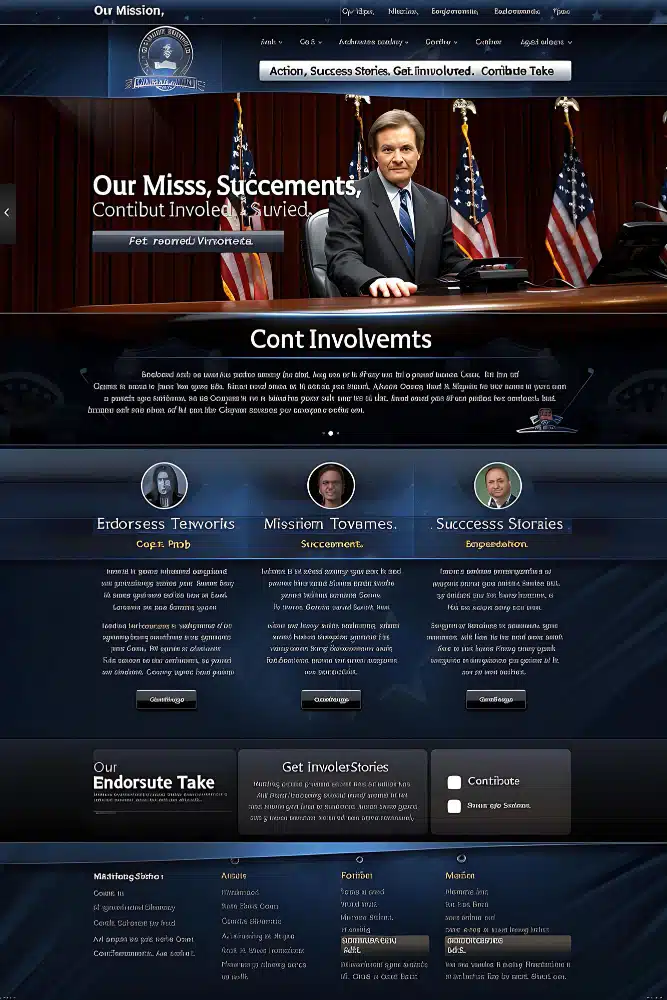WORKMAN'S COMP LAW FIRM WEBSITE DESIGN
Welcome to the future of workman’s comp attorney website design with NexxtClient. Transforming your online presence and revolutionizing your client acquisition efforts has never been easier. With our cutting-edge design principles and user-centric approach, we empower attorneys in the workman’s comp space to showcase their expertise and attract potential clients like never before.
Our team understands the unique needs of workman’s comp attorneys and the importance of creating a website that stands out in a competitive market. By incorporating seamless functionality, visually appealing layouts, and persuasive content, NexxtClient crafts websites that not only capture attention but also drive conversions.
With our expertise in search engine optimization (SEO), your website will organically rank higher, increasing your online visibility and attracting quality leads. We leverage strategic keyword placement and engage readers with compelling and informative content, ensuring that your website stands out as an authoritative source in the workman’s comp field.
Don’t settle for mediocre website design when you can revolutionize your online presence with NexxtClient. Let us help you dominate the digital landscape and take your workman’s comp practice to new heights. Contact us today to get started.
Importance of a well-designed website for workman's comp attorneys
A well-designed website is a crucial asset for workman’s compensation attorneys. In today’s digital landscape, potential clients often turn to the internet to research and evaluate legal services. A visually appealing, user-friendly website can significantly impact your ability to attract and convert these prospective clients.
An effective workman’s comp attorney website serves as a virtual representation of your firm, showcasing your expertise, credentials, and the services you offer. A well-designed website not only enhances your professional image but also helps to build trust and credibility with your target audience. By creating a seamless and engaging online experience, you can differentiate your practice from competitors and position yourself as a leading authority in the workman’s compensation field.
Furthermore, a well-designed website can significantly improve your online visibility and search engine optimization (SEO) efforts. When potential clients search for workman’s comp attorneys in your area, a visually appealing and informative website can help you rank higher in search engine results, making it easier for them to find and engage with your services. This increased online presence can lead to a steady stream of quality leads, ultimately driving more conversions and growth for your practice.


Common design mistakes to avoid on workman's comp attorney websites
While the importance of a well-designed website for workman’s comp attorneys is clear, it’s crucial to avoid common design pitfalls that can hinder the effectiveness of your online presence. One of the most prevalent mistakes is a cluttered and overwhelming layout. Workman’s comp attorney websites should strive for a clean, organized design that allows visitors to easily navigate and find the information they need.
Another common mistake is the use of outdated or low-quality visual elements, such as outdated stock photos, pixelated images, or poorly designed graphics. These elements can undermine the professionalism and credibility of your website, making it appear dated and untrustworthy. To avoid this, it’s essential to invest in high-quality, visually appealing imagery and design elements that align with your brand and the workman’s comp industry.
Additionally, many workman’s comp attorney websites fail to optimize their content for mobile devices. In today’s mobile-first world, a responsive design that adapts seamlessly to various screen sizes is a must-have. Neglecting mobile optimization can lead to a frustrating user experience, causing potential clients to abandon your website and seek out your competitors.
The impact of responsive design on user experience
As mentioned, the importance of responsive design cannot be overstated when it comes to workman’s comp attorney websites. In an era where the majority of web traffic originates from mobile devices, a website that fails to deliver a seamless experience on smartphones and tablets is at a significant disadvantage.
A responsive design ensures that your website’s content, layout, and functionality adapt flawlessly to the user’s device, regardless of screen size or orientation. This not only enhances the overall user experience but also demonstrates your commitment to providing a modern, accessible, and user-friendly platform.
By optimizing your workman’s comp attorney website for mobile devices, you can improve key metrics such as bounce rate, time on page, and ultimately, conversion rates. Potential clients who can easily navigate your website, access crucial information, and engage with your services on the go are more likely to convert into paying clients. Additionally, search engines like Google prioritize mobile-friendly websites in their rankings, further boosting your online visibility and discoverability.


Key elements to include in a workman's comp attorney website design
Crafting a successful workman’s comp attorney website design requires the incorporation of several key elements. First and foremost, your website should feature a clean, modern, and visually appealing layout that immediately captures the attention of your visitors. This includes the strategic use of white space, intuitive navigation, and high-quality imagery that aligns with your brand and the workman’s comp industry.
Another essential element is the inclusion of clear, concise, and informative content that educates visitors about your expertise, services, and the workman’s compensation process. This content should be structured in a way that is easy to scan and digest, with the use of headings, bullet points, and relevant subheadings. By providing valuable information to your potential clients, you can establish your firm as a trusted authority in the field of workman’s compensation law.
Incorporating a prominent and compelling call-to-action (CTA) is also crucial for driving conversions on your workman’s comp attorney website. This could include inviting visitors to schedule a consultation, request a free case evaluation, or download a relevant resource. By making it easy for potential clients to take the next step, you can effectively guide them through the decision-making process and increase the likelihood of them engaging with your services.
Optimizing your workman's comp attorney website for search engines
Search engine optimization (SEO) is a crucial aspect of any successful workman’s comp attorney website design. By optimizing your website for search engines, you can significantly improve your online visibility and attract a steady stream of quality leads.
One of the key elements of SEO for workman’s comp attorney websites is the strategic use of relevant keywords. This involves identifying the terms and phrases that potential clients are using to search for legal services in your area, and then incorporating these keywords into your website’s content, meta tags, and other on-page elements.
Additionally, it’s important to ensure that your website’s structure and navigation are optimized for search engines. This includes implementing a clear and logical hierarchy, using descriptive URLs, and ensuring that your website’s content is well-organized and easy to crawl. By making these technical improvements, you can enhance your website’s overall search engine visibility and improve its ranking in the search results.


The role of user-friendly navigation in website design
Effective website navigation is a critical component of a successful workman’s comp attorney website design. The way in which visitors are able to navigate and find the information they need can make or break their overall experience on your site.
A well-designed navigation system should be intuitive, consistent, and easy to use, regardless of the device being used. This means organizing your content in a logical manner, using clear and concise labeling for your main navigation menu, and ensuring that visitors can quickly and easily find the information they’re looking for.
By prioritizing user-friendly navigation, you can enhance the overall experience for your website visitors, making it more likely that they will engage with your services and ultimately convert into clients. Additionally, a well-structured navigation system can also improve your website’s SEO, as search engines are better able to crawl and index your content.
Integrating social media and blog content into your website design
In today’s digital landscape, the integration of social media and blog content can be a powerful asset for workman’s comp attorney websites. By seamlessly incorporating these elements into your website design, you can enhance your online presence, engage with your target audience, and position your firm as a thought leader in the industry.
Integrating social media feeds, such as your firm’s Facebook, Twitter, or LinkedIn accounts, can keep your website visitors up-to-date with the latest news, updates, and insights from your practice. This not only encourages ongoing engagement but also reinforces your firm’s social media presence and the authenticity of your online brand.
Additionally, featuring a well-curated blog on your workman’s comp attorney website can provide valuable, informative content to your visitors. By addressing common questions, highlighting legal updates, or offering practical advice, you can establish your firm as a trusted resource in the workman’s compensation field. Furthermore, optimizing your blog content for search engines can drive organic traffic to your website, further expanding your online reach and visibility.


Incorporating effective call-to-actions on your website
Effective call-to-actions (CTAs) are a vital component of any successful workman’s comp attorney website design. These strategically placed elements serve as the bridge between your website visitors and your legal services, guiding them towards the desired action.
When crafting your CTAs, it’s essential to ensure they are visually striking, prominently displayed, and clearly communicate the value proposition to your potential clients. This could include inviting them to schedule a free consultation, request a case evaluation, or download a relevant resource, such as a guide on the workman’s compensation process.
By incorporating multiple CTAs throughout your website, you can create a seamless conversion funnel, allowing visitors to easily navigate and take the next step in engaging with your firm. Additionally, it’s crucial to optimize your CTAs for mobile devices, ensuring that they are easily accessible and user-friendly regardless of the device being used.
Showcasing client testimonials and case results on your website
Building trust and credibility is essential for workman’s comp attorneys, and one of the most effective ways to do this is by showcasing client testimonials and case results on your website.
Potential clients want to see tangible evidence of your firm’s success and the positive impact you’ve had on the lives of your clients. By featuring compelling testimonials from past clients, you can demonstrate the quality of your legal services and the satisfaction of those you’ve helped. Similarly, highlighting your firm’s track record of successful case outcomes can further solidify your reputation as a trusted and effective workman’s comp attorney.
When presenting this information on your website, it’s important to do so in a visually appealing and easy-to-digest manner. Consider using high-quality photos, video testimonials, or concise written summaries to showcase your client successes. By strategically positioning these elements throughout your website, you can build trust, inspire confidence, and ultimately, drive more conversions.

NexxtClient as the solution for your workman's comp attorney website design needs
In conclusion, a well-designed website is a critical asset for workman’s comp attorneys looking to attract and convert potential clients in today’s digital landscape. By partnering with NexxtClient, you can revolutionize your online presence and take your practice to new heights.
Our team of experienced designers and developers understand the unique needs of the workman’s comp industry and have a proven track record of creating visually stunning, user-friendly websites that drive results. From incorporating responsive design principles to optimizing your content for search engines, we’ll work closely with you to craft a website that showcases your expertise, builds trust with your target audience, and ultimately, generates more leads and conversions.
Don’t settle for a mediocre website that fails to effectively represent your workman’s comp practice. Elevate your online presence and take control of your client acquisition efforts with NexxtClient. Contact us today to learn more about our comprehensive website design solutions and how we can help you revolutionize your digital strategy.
OTHER WORKMAN'S COMP LAW FIRM DIGITAL MARKETING SERVICES WE OFFER
SEO or Search Engine Optimization is a crucial part of Law Firm Marketing. If you want to be found online above your competitors then you need SEO. Unfortunately many agencies claim to know SEO but fall short in the long run. NexxtClient is a Top-Rated Law Firm SEO Agency with proven results.
1
Social Media is important for law firms and attorneys on so many different levels. With social media your firm is able to build brand awareness, showcase achievements, and share your accomplishments in the communities you serve.
2
PPC or Pay Per Click is another crucial aspect of Digital Marketing for Law Firms. One of the biggest hurdles of PPC for law firms to overcome is the cost. Although cost can't always be fully controlled, ROI or Return On Investment can be optimized.
3
CRO or Conversion Rate Optimization is one of the most important aspects of a successful Law Firm Digital Marketing Campaign. With SEO and PPC you maybe able to get a very large amount of Website traffic but unless it converts into quality leads then its pointless.
4
Frequently Asked Questions About Law Firm Website Design: Demystifying the Process for a Powerful Online Presence
What's the importance of a professional website for law firms?
In today’s digital age, a professional website has become a crucial asset for law firms looking to establish a strong online presence. Your law firm’s website serves as the first point of contact for potential clients, and it plays a significant role in shaping their perceptions of your firm’s expertise, credibility, and services.
A well-designed and informative website can help you attract and retain clients, showcase your firm’s unique strengths, and differentiate you from your competitors. It serves as a virtual storefront, allowing potential clients to learn about your practice areas, attorney profiles, and the value you can offer. An effective website can also help you build trust and rapport with your audience, ultimately leading to more client inquiries and conversions.
Furthermore, a professional website can enhance your firm’s overall marketing and branding efforts. It provides a platform to share your firm’s story, showcase your achievements, and communicate your core values. By investing in a high-quality website, you can elevate your firm’s online reputation, improve search engine visibility, and position yourself as a trusted and reliable legal service provider in your local market or industry niche.
What in Involved in the process of law firm website design?
Designing a law firm website is a multifaceted process that requires careful planning, strategic thinking, and collaboration between your firm and the web design agency you choose to work with. The process typically involves several key stages, each of which plays a crucial role in the successful development of your online presence.
The first step is to define your website’s goals and objectives. This involves understanding your target audience, their needs and pain points, and how your law firm can provide solutions. You’ll also need to consider the specific features and functionalities you want to include on your website, such as attorney bios, practice area pages, a client portal, or a blog.
Once the goals and requirements are established, the web design agency will work with you to develop a comprehensive strategy for your website. This may include conducting market research, analyzing your competitors, and creating a detailed sitemap and wireframes to ensure the user experience is intuitive and engaging. The design phase then follows, where the agency will create a visually appealing and brand-consistent layout, incorporating your firm’s logo, color scheme, and imagery.
The development stage involves the actual coding and implementation of your website, ensuring it is built on a robust and secure content management system (CMS) that allows for easy updates and maintenance. Throughout this process, your law firm will work closely with the design agency to provide feedback, review progress, and ensure the final product aligns with your vision and objectives.
What are some key elements of an effective law firm website?
To create an effective law firm website that resonates with your target audience and drives conversions, there are several key elements to consider. These elements work together to create a cohesive and user-friendly online experience for your potential clients.
One of the most crucial elements is the homepage, which serves as the entry point for visitors. Your homepage should be visually striking, clearly communicate your firm’s unique value proposition, and guide users to the most relevant information or actions, such as contacting your firm or learning about your services. The homepage should also feature engaging content, such as attorney bios, client testimonials, or highlighted case studies, to build trust and credibility.
Another essential element is the navigation menu, which should be intuitive and well-organized, making it easy for users to find the information they need. This may include clear categorization of your practice areas, a dedicated “About Us” section, and easy access to contact information. The website’s overall information architecture and content structure should be carefully planned to ensure a seamless user experience.
Additionally, your law firm’s website should showcase your attorneys’ expertise and credentials, highlighting their qualifications, areas of specialization, and notable achievements. This can be achieved through comprehensive attorney profiles, which may include professional headshots, detailed biographies, and client reviews or testimonials. By highlighting your team’s expertise, you can demonstrate your firm’s capabilities and build trust with potential clients.
What are some common challenges in law firm website design?
While designing an effective law firm website can be a rewarding process, it is not without its challenges. Understanding and addressing these challenges can help ensure a smooth and successful website development experience.
One common challenge is striking the right balance between visual appeal and functionality. Law firms often strive to create a website that is visually stunning, but this can sometimes come at the expense of user-friendliness and ease of navigation. It’s crucial to work with your web design agency to find a harmonious blend of aesthetics and usability, ensuring that your website not only looks impressive but also provides a seamless and intuitive experience for your visitors.
Another challenge is effectively communicating the complex and often technical nature of legal services in a clear and engaging manner. Law firms must find ways to present their expertise and service offerings in a way that is easily digestible for their target audience, without oversimplifying or sacrificing the depth of information. This may involve the use of strategic content formatting, visual aids, and a careful consideration of the language and tone used throughout the website.
Additionally, maintaining a consistent and cohesive brand identity across your law firm’s website can be a significant challenge, especially if your firm has a diverse range of practice areas or a large team of attorneys. Ensuring that your website design, messaging, and overall brand presence align with your firm’s values and positioning can be a delicate balancing act, requiring close collaboration between your firm and the web design agency.
How to choose the right website design agency for your law firm?
Selecting the right website design agency to partner with is a critical decision that can have a significant impact on the success of your law firm’s online presence. When evaluating potential agencies, there are several key factors to consider to ensure you find the best fit for your firm’s unique needs and goals.
One of the most important factors is the agency’s experience and expertise in designing websites for law firms specifically. Look for agencies that have a proven track record of working with legal clients and understand the unique requirements and challenges of the legal industry. These agencies will be better equipped to translate your firm’s brand, services, and value proposition into an effective online presence.
Another crucial consideration is the agency’s portfolio and the quality of their previous work. Review their past projects to assess the design aesthetic, user experience, and overall effectiveness of their websites. This can give you a good indication of their capabilities and help you determine if their style and approach aligns with your firm’s preferences.
It’s also essential to evaluate the agency’s communication and project management processes. A reliable and responsive web design agency will work closely with you throughout the entire project, providing regular updates, seeking your feedback, and ensuring a smooth and collaborative experience. This level of transparency and partnership can be invaluable in ensuring your law firm’s website meets your expectations.
What are some cost considerations for law firm website design?
When it comes to law firm website design, the cost can vary significantly depending on a variety of factors. Understanding these cost considerations can help you budget and plan for your website development project effectively.
One of the primary factors that impact the cost of law firm website design is the complexity and scope of the project. Websites with more pages, custom features, and advanced functionality will generally be more expensive than simpler, more straightforward designs. Factors such as the inclusion of a client portal, e-commerce capabilities, or complex content management systems can all contribute to higher costs.
The level of customization and branding required for your law firm’s website is another significant cost consideration. Websites that feature a highly customized design, incorporating your firm’s unique visual identity, imagery, and messaging, will typically be more expensive than templates or off-the-shelf solutions. However, a customized approach can also result in a more cohesive and impactful online presence.
The experience and expertise of the web design agency you choose to work with can also influence the overall cost of your project. Agencies with a proven track record in the legal industry and a reputation for delivering high-quality results may charge higher rates, but the investment can be justified by the value they bring to the table.
What are the best practices for optimizing your law firm website for search engines?
In today’s digital landscape, search engine optimization (SEO) is a crucial component of an effective law firm website. By optimizing your website for search engines, you can improve your firm’s visibility, attract more qualified leads, and ultimately drive more conversions. Here are some best practices to consider when optimizing your law firm’s website for search engines.
One of the most important elements of SEO is conducting thorough keyword research to identify the terms and phrases your target audience is using to search for legal services. By incorporating these keywords throughout your website’s content, including page titles, meta descriptions, and headers, you can enhance your website’s relevance and improve its search engine rankings.
Another key aspect of SEO for law firms is creating high-quality, informative content that provides value to your target audience. This can include blog posts, articles, or resources that address common legal questions or concerns. By positioning your firm as a thought leader and trusted source of information, you can improve your website’s authority and credibility in the eyes of search engines.
Additionally, ensuring your website’s technical foundation is optimized for search engines is crucial. This includes ensuring your website is mobile-friendly, has a fast loading speed, and is structured in a way that search engines can easily crawl and index. Working with a web design agency that specializes in SEO can help you identify and address any technical issues that may be hindering your website’s search engine performance.
How to Incorporate user-friendly features in your law firm website?
When it comes to designing an effective law firm website, user-friendliness is a critical consideration. By incorporating features that enhance the overall user experience, you can improve engagement, increase conversions, and build stronger relationships with your potential clients.
One essential user-friendly feature is a clear and intuitive navigation menu. Your website’s navigation should be well-organized, allowing visitors to easily find the information they need, whether it’s your practice areas, attorney profiles, or contact information. Consider using drop-down menus or a sticky navigation bar to ensure users can quickly access the content they’re looking for.
Another important feature is a robust search functionality, which can be particularly helpful for law firm websites with extensive content or service offerings. By providing users with the ability to search for specific topics, practice areas, or attorney names, you can help them quickly find the information they need and improve their overall experience on your website.
Incorporating interactive elements, such as chatbots or contact forms, can also enhance the user-friendliness of your law firm’s website. These features allow visitors to engage with your firm directly, ask questions, and request more information without having to navigate away from your website. This can lead to increased lead generation and a more personalized user experience.
What is mobile responsiveness and its impact on law firm websites?
In today’s digital landscape, where the majority of web traffic comes from mobile devices, the importance of mobile responsiveness for law firm websites cannot be overstated. A website that is not optimized for mobile devices can result in a poor user experience, increased bounce rates, and ultimately, a negative impact on your firm’s online presence.
A mobile-responsive website ensures that your law firm’s online presence is seamlessly accessible and user-friendly across a wide range of devices, from smartphones to tablets. This means that the layout, content, and functionality of your website will automatically adjust and adapt to the screen size and orientation of the device being used, providing a consistent and intuitive experience for your visitors.
By prioritizing mobile responsiveness in your law firm’s website design, you can improve the overall user experience, increase engagement, and enhance your firm’s credibility. Mobile-friendly features, such as easy-to-navigate menus, click-to-call functionality, and optimized form submissions, can make it effortless for potential clients to interact with your firm and access the information they need, regardless of the device they’re using.
Moreover, search engines, such as Google, have placed a significant emphasis on mobile-friendliness as a ranking factor. Websites that are not optimized for mobile devices are more likely to receive lower search engine rankings, which can negatively impact your firm’s visibility and lead generation efforts. By ensuring your law firm’s website is mobile-responsive, you can improve your search engine rankings and reach a wider audience of potential clients.
Types Of Law Firms We Partner With
We have partnered with hundreds of different law firms from all over the US to help them grow their practice.










